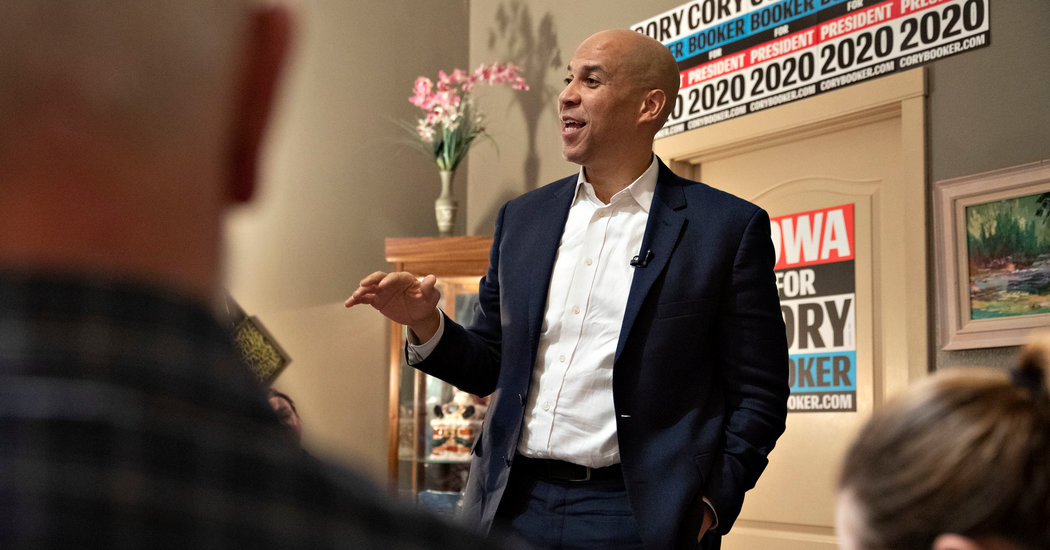
WASHINGTON — At the urging of Senator Cory Booker of New Jersey, eight Democratic presidential candidates, and Mr. Booker, have signed a letter urging Tom Perez, the Democratic National Committee chairman, to lower the thresholds to qualify for the party’s January and February debates.
The letter, written and circulated by the Booker campaign, was sent to Mr. Perez and his top deputies Saturday afternoon. It comes amid angst that Thursday’s debate in Los Angeles will include just one candidate of color — the businessman Andrew Yang — among the seven qualifying participants.
Mr. Booker did not qualify for next week’s debate and is unlikely to meet the criteria for the debates in January and February unless thresholds are lowered or he sees a significant improvement in his polling numbers.
The nine candidates — former Vice President Joseph R. Biden Jr., Senators Bernie Sanders of Vermont, Elizabeth Warren of Massachusetts and Amy Klobuchar of Minnesota, Mayor Pete Buttigieg of South Bend, Ind., the businessman Tom Steyer, the former Housing secretary Julián Castro, Mr. Yang and Mr. Booker — asked Mr. Perez to use either a polling or fund-raising threshold, but not both.
Such a rule would vastly expand the roster, to most likely include not just Mr. Booker and Mr. Castro, but also former Mayor Michael R. Bloomberg of New York and others who have not made the stage in months, and would almost certainly lead to two nights of debating.
“Candidates who have proven both their viability and their commitment to the Democratic Party are being prematurely cut out of the nominating contest before many voters have even tuned in — much less made their decision about whom to support,” reads the letter.
The signatories said they “encourage the D.N.C. to consider for the January and February debates returning to the previous criteria that allowed candidates to qualify to participate either via meeting a minimum polling threshold or meeting a number of grass roots donors to demonstrate broad-based support.”
Allies of Mr. Booker and Mr. Castro have argued that self-funding billionaires like Mr. Steyer and Mr. Bloomberg can game the thresholds by spending millions on television advertising and, in Mr. Steyer’s case, to acquire lists of donors. Mr. Bloomberg has said he will not accept campaign contributions.
The D.N.C. spokeswoman Xochitl Hinojosa called the committee’s debate criteria fair, and noted that no campaign objected when the thresholds were announced earlier this year. No television network has agreed to host two nights of debates in January or February, she said.
“The D.N.C. will not change the threshold for any one candidate and will not revert to two consecutive nights with more than a dozen candidates,” Ms. Hinojosa said. “Our qualification criteria is extremely low and reflects where we are in the race.”
Mr. Booker failed to qualify for Thursday’s debate after failing to reach 4 percent support in any qualifying poll; four such polls were required. He said Wednesday that he would not “argue with the refs” about debate rules. Mr. Castro also has refrained from attacking Mr. Perez over debate rules.
It is not clear how robustly the other campaigns believe debate thresholds should be lowered. Some campaign staffers said privately Saturday that they felt obligated to sign the Booker letter or risk appearing racist, or unsupportive of an effort to be inclusive of candidates of color. Many have complained privately for months about the number of candidates on the debate stage, a gripe Mr. Biden has regularly made in public. In June and July, 20 candidates qualified for the debates, resulting in back-to-back nights with 10 candidates in each.
“Look, I think everybody knows these aren’t debates,” Mr. Biden told reporters during a September stop in Cedar Rapids, Iowa. “These are one-minute assertions.”
Mr. Perez, in an interview Wednesday, said next week’s debate field became only less diverse when Senator Kamala Harris of California, who had qualified, ended her campaign last week. No candidate, he said, has won the nomination without having at least 4 percent support by December.
“As we get closer and closer, you need to demonstrate that you are making progress,” Mr. Perez said. “That is a time-honored practice, and it’s a good practice because you do have to demonstrate that you’re making progress.”
Lisa Lerer contributed reporting.
